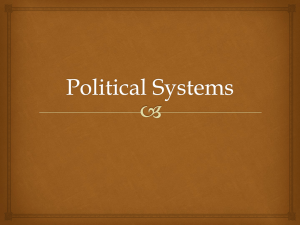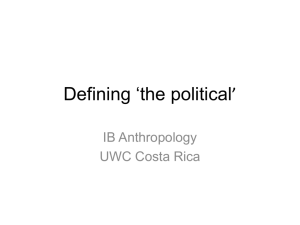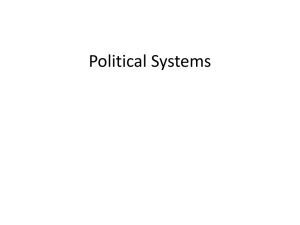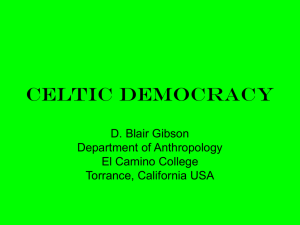Document 15687935
advertisement
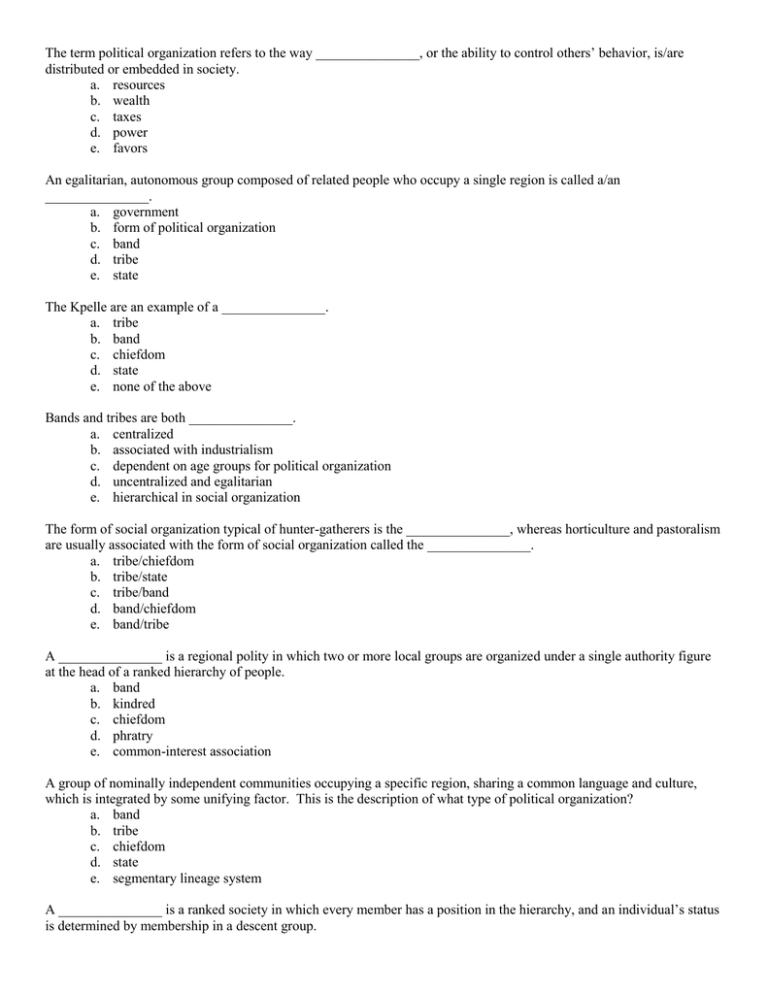
The term political organization refers to the way _______________, or the ability to control others’ behavior, is/are distributed or embedded in society. a. resources b. wealth c. taxes d. power e. favors An egalitarian, autonomous group composed of related people who occupy a single region is called a/an _______________. a. government b. form of political organization c. band d. tribe e. state The Kpelle are an example of a _______________. a. tribe b. band c. chiefdom d. state e. none of the above Bands and tribes are both _______________. a. centralized b. associated with industrialism c. dependent on age groups for political organization d. uncentralized and egalitarian e. hierarchical in social organization The form of social organization typical of hunter-gatherers is the _______________, whereas horticulture and pastoralism are usually associated with the form of social organization called the _______________. a. tribe/chiefdom b. tribe/state c. tribe/band d. band/chiefdom e. band/tribe A _______________ is a regional polity in which two or more local groups are organized under a single authority figure at the head of a ranked hierarchy of people. a. band b. kindred c. chiefdom d. phratry e. common-interest association A group of nominally independent communities occupying a specific region, sharing a common language and culture, which is integrated by some unifying factor. This is the description of what type of political organization? a. band b. tribe c. chiefdom d. state e. segmentary lineage system A _______________ is a ranked society in which every member has a position in the hierarchy, and an individual’s status is determined by membership in a descent group. a. b. c. d. e. band tribe chiefdom state kindred The primary means of distributing goods in a chiefdom is a. reciprocity b. negative reciprocity c. redistribution d. market exchange e. silent trade The state is distinctive in the extensiveness of its legitimate use of _______________ to regulate the affairs of its citizens. a. kinship b. force c. chiefs d. religion e. gossip A centralized political system with the power to coerce is a _______________. a. tribe b. chiefdom c. state d. tonowi e. redistributive system In a chiefdom, an individual’s status is determined by membership in a _______________. a. b. c. d. e. government social class bureaucracy descent group secret society The _______________ is the most formal of political organizations and is one of the hallmarks of civilization. Its political power is centralized in a government, which may legitimately use force to regulate the affairs of its citizens, as well as its relations with other similar political systems. a. band b. tribe c. chiefdom d. state e. kindred Among the Igbo of Nigeria, ______________. a. men and women each had separate, autonomous spheres of political activity b. women were bought and sold as slaves c. women were imprisoned in their homes and allowed out only on marketing days d. men and women lived in separate villages e. men had no political role in the village, which was controlled and ruled by women When the British imposed colonial rule on the Igbo of Nigeria, _______________. a. they killed all the women b. they introduced changes that sustained the equality of political power between the sexes c. they introduced changes that made women more powerful than men d. they did not recognize the political power of women, and introduced changes that resulted in women becoming subordinate to men e. they introduced changes that caused men to change into women How is social order maintained in bands and tribes? a. public beatings b. murder carried on under cover of darkness c. occasional use of police and the court system d. threats of killing the first-born child e. gossip and fear of supernatural forces Wape villagers avoid quarreling with each other because _______________. a. they are afraid that a ghost will misdirect a bullet and kill a quarreling person during hunting b. they believe that a hunter misses his prey only because of the intervention of ancestral ghosts who are angry with quarreling in the community c. they know they will be put in jail by the New Guinea government d. a hunter will refuse to loan his gun to a quarreling person e. the ancestors will go away from their villages if they quarrel Sanctions refer to _______________. a. b. c. d. e. internalized social controls holy behavior externalized social controls decadent behavior ritualized behavior _______________ sanctions attempt to precisely and explicitly regulate people’s behavior. They can be positive (such as military decorations) or negative (such as imprisonment). a. Hierarchical b. Egalitarian c. Informal d. Formal e. Magical Which of the following is not a form of political organization? a. tribe b. band c. group d. chiefdom e. state A method of resolving disputes in which the disputing parties voluntarily arrive at a mutually satisfactory agreement is called _______________. a. negotiation b. mediation c. adjudication d. use of sanctions e. law Which of the following are likely to be associated with warfare? a. centralized political systems b. the rise of cities c. a technology that supports population growth d. possession of complex, valuable property e. all of the above Which of the following is part of an uncentralized political system? a. band b. chiefdom c. state d. a and b only e. b and c only Power based on _______________ always results in authority. a. b. c. d. e. legitimacy mediation negotiation sanctions inevitability _______________ is the ability of individuals or groups to impose their will upon others and make them do things even against their own will. a. force b. sanction c. legitimacy d. authority e. power Which of the following political systems would be considered centralized system? a. states b. bands c. chiefdoms d. tribes e. a and c In the United States, the man who wears tennis shorts to a church service may be subject to a variety of _______________ sanctions, ranging from disapproving glances from the clergy to the chuckling of other parishioners. a. social b. anti-social c. positive d. formal e. informal Awards like the Nobel Peace Prize are examples of _______________ sanctions, by which societies promote approved behavior. a. positive b. negative c. political d. informal e. economic Which of the following are minority nations is trying to improve its political position by founding an independent state? a. Kurds b. Palestinians c. Chechens d. Aceh e. all of the above _______________ is viewed most simply as organized belief in the supernatural, and all fulfill numerous social and psychological needs. a. Curanderismo b. c. d. e. Magic Shamanism Voodoo Religion _______________ may be defined as the beliefs and patterns of behavior by which people try to control those aspects of the universe that are otherwise beyond their control. a. Political organization b. Government c. Kinship d. Common-interest associations e. Religion A people’s collection of gods and goddesses is called a _______________. a. mana b. shaman c. pantheon d. priest e. fetish Belief in _______________ is found in societies in which women make a major contribution to the economy and are relatively equal to men in power and authority. a. mana b. gods c. goddesses d. fetishes e. ancestor worship The belief that nature is animated with spirits is called _______________. a. animation b. anima c. animatism d. animism e. ennui The major difference between animism and animatism has to do with whether the supernatural force which occupies an entity is _______________. a. personal or impersonal (a being or an impersonal force without identity) b. natural or supernatural c. a god or an ancestral spirit d. a priest or a shaman e. an example of witchcraft or of divination Which of the following is an example of animism? a. a lucky baseball bat b. the goddess Athena in Greek mythology c. the god Zeus d. an ancestral spirit e. the malevolent spirit inside your baseball who jumps erratically through the air just as you think you’re about to hit a home run A rabbit’s foot in Western culture; the overwhelming sense of beauty with which a particular place “such as Yosemite or the top of Pike’s Peak, or Luke Skywalker telling Han Solo, “May the Force be with you”—all of these may be used as examples of _______________. a. animism b. animatism c. pantheon d. sympathetic magic e. divination In acting as a healer, the shaman _______________. a. provides reassurance to the community through an elaborate drama that may involve trickery b. may use modern medical techniques c. may be coping with his/her own problems by becoming intensely involved with the problems of others d. may improve the patient’s state of mind, which aids in recovery e. all but b Ceremonies such as bar mitzvahs, elaborate wedding ceremonies, baby showers, and graduation parties that help individuals make major changes in their lives are referred to as rites of _______________. a. transition b. intensification c. separation d. passage e. incorporation The anthropologist Arnold Van Gennep analyzed ceremonies that help individuals through crucial stages of their life cycles. He said that each ceremony may be analytically divided into three stages, _______________, transition, and incorporation. a. inculcation b. separation c. revitalization d. intensification e. initiation The initiation rites for male Australian aborigines include a stage when they are isolated from the rest of society and undergo a cram course in tribal lore; the trauma associated with their ordeal is part of a teaching method that ensures that they will remember what they are taught. This particular stage in the puberty ceremony would be referred to as the stage of _______________ by Arnold Van Gennep. a. initiation b. intensification c. separation d. transition e. incorporation Rites of _______________ help groups get through crises such as drought or some other external threat to the survival of the group. a. separation b. revolution c. rebellion d. passage e. intensification Many magical incantations require the use of fingernail clippings of the intended victim. This is an example of _______________. a. imitative magic b. contagious magic c. witch magic d. nightmare magic e. scientific thinking _______________ magic is based on the assumption that things that are like each other somehow have a connection with each other; and thus if you do something to one, it will affect the other. a. b. c. d. e. Scientific PseudoImitative Compulsive Contagious _______________ is an explanation of misfortune based on the belief that certain individuals possess an innate, psychic power capable of causing harm, including sickness and death. a. Imitative magic b. Contagious magic c. Witchcraft d. all of the above e. none of the above A _______________ is a deliberate effort by members of a society to construct a more satisfying culture. a. divination b. rite of intensification c. fetish d. segmentary lineage system e. revitalization movement In one of anthropology’s classic works, _______________ analyzed the rites of passage that help individuals through the crucial crises of their lives. a. b. c. d. e. Erik Erikson Hilda Kuper Carlos Castaneda Arnold Van Gennep Sir James Frazer _______________ is typical of peoples who see themselves as a part of nature rather than superior to it. a. b. c. d. e. Christianity Judaism Islam Animism Animatism _______________ forms part of a cultural system’s superstructure, which comprises a society’s worldview. a. Political philosophy b. Economic organization c. Social structure d. Religion e. The arts Which of the following nature-oriented religions has 310,000 adherents today in the United States? a. Lutheran b. Buddhism c. Shintoism d. Wicca e. Holy Roller Most people plan for the future by looking at trends in _______________. a. ancient history b. hemlines c. third-world countries d. food supplies e. recent history Anthropologists are _______________, meaning they take into account many interacting factors to understand the functioning of a complex whole. a. evolutionary b. cross-cultural c. holistic d. relativistic e. ethnocentric Anthropologists are trained to develop effective predictions of the future because they _______________. a. are holistic in perspective b. are good at seeking how parts fit together into a larger whole c. are trained to have an evolutionary perspective d. are able to see short-term trends in longer-term perspective e. all of the above Approximately how many people now live outside their countries of birth? a. 1 billion b. 250 million c. 175 million d. 85 million e. 55 million Over the past 5,000 years, political units have _______________. a. grown steadily smaller in size b. grown steadily larger in size and fewer in number c. eliminated multinational corporations d. promoted individual freedoms e. eliminated slavery Global corporations _______________. a. have been widespread in Western culture since medieval times b. were very common during the colonial period c. have become a major force in the world today since the 1950s d. have been disintegrating since the 1950s e. promote relativistic rather than ethnocentric ideas Which of the following expresses the negative consequences of global corporations on the international and domestic scenes? a. Global corporations crosscut nations and thus achieve a global unity. b. Global corporations have become a major force in the world since the 1950s. c. Global corporations have become so powerful that they have been able to influence government decisions so that they benefit the company rather than the people. d. Global corporations are products of the technological revolution. e. They have developed sophisticated data-processing techniques that enable them to keep track of worldwide operations. In their search for cheap labor, global corporations have tended to favor _______________ for low skilled assembly jobs. a. b. c. d. e. women children North Americans third-world males non-human primates One of the consequences of the development of global culture has been _______________. a. b. c. d. e. the disappearance of differences between people reduction in the possibility of war a resurgence of separatist movements the replacement of traditional cultures by more adaptive, modern cultures reduction in the number of anthropologists _______________ is a public policy for managing cultural diversity in a multi ethnic society. a. Acculturation b. Multiculturalism c. Modernization d. Innovation e. Global unity Cultural pluralism _______________. a. may constitute a temporary stage in a process of integration into a single melting-pot culture b. implies the absence of bigotry and racism c. implies respect for the cultural traditions of other peoples d. may result from conquest or from several culturally distinct groups occupying an area that eventually becomes unified as a larger political entity e. all of the above In the United States there are _______________ different ethnic groups within its borders (in addition to hundreds of federally recognized American Indians). a. 543 b. 57 c. 179 d. 234 e. 120 _______________ is violence produced by social, political, and economic structures rather than by the unique and personal decisions of individuals. a. Torture b. Modernization c. Structural violence d. Insanity e. Religion The change from subsistence farming to cash crops _______________. a. enables farmers to enlarge their holdings and feed their families more effectively b. results in the relocation of subsistence farmers to urban areas or to lands ecologically unfit for farming c. leads to the decline of multinational corporations d. supports cultural pluralism e. leads to revitalization An Asian wet rice farmer might choose not to adopt North American techniques of intensive agriculture because _______________. a. he cannot afford to buy the chemical products typically used in this type of agriculture b. the North American method requires at least 8 calories of energy to be expended for every calorie produced, whereas the wet rice farmer produces 300 calories for every calorie he invests c. the North American method produces toxic substances that destroy delicate ecological balances d. the North American method, while successful for a short period of time, is sowing the seed of its own destruction e. all of the above The worldwide spread of such products as Pepsi is taken by some as a sign that a _______________ world culture is developing. a. standardized b. heterogeneous c. homogeneous d. motley e. varied So great is the power of _______________ that they increasingly thwart the wishes of governments. a. b. c. d. e. tribal groups chiefdoms bands global corporations states _______________ is the social and political interaction of people with different ways of living and thinking within the same society of a multinational state. a. b. c. d. e. Cultural pluralism Homogenization Diversification Revitalization Multinationalization Of all the world’s states, _______________ is one of the very few where pluralism really has worked out to the satisfaction of all parties to the arrangement. a. b. c. d. e. Northern Ireland. Rwanda Switzerland the United States Botswana The current world population is around _______________ billion. a. b. c. d. e. 7 3 4 8 6 According to the authors of your textbook, _______________ has become a direct threat to humanity. a. b. c. d. e. pestilence war pollution racism Insufficient food production The one thing that all large states, past and present, irrespective of other differences among them, share in common is _______________. a. b. c. d. e. a tendency to grow beyond their capacity to maintain their society a tendency to fragment a tendency to stagnate a tendency toward the development of a dictatorship a tendency toward the development of a democracy Coercive power that is backed up by economic and military force is called _______________. a. structural violence b. imposed force c. coercion d. hard power e. soft power Today, about _______________ people in almost half of the world´s countries are either internally displaced or have crossed international borders as refugees. a. 11 million b. 47 million c. 1 billion d. 73 million e. 35 million In _______________ indigenous peoples joined together to establish the World Council of Indigenous Peoples. a. 1964 b. 1983 c. 1975 d. 1994 e. 2005 Global warming is primarily caused by _______________. a. climate shifts b. tilting of the earth c. loss of ozone d. burning fields e. burning fossil fuels
